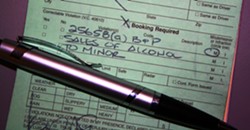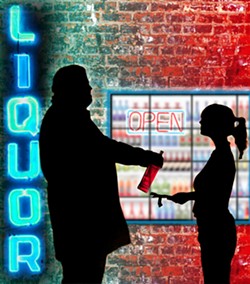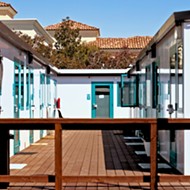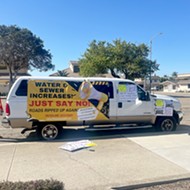[{
"name": "Newsletter Promo",
"id": "NewsletterPromo",
"class": "inlineCenter",
"insertPoint": "4",
"component": "15264767",
"requiredCountToDisplay": "0"
},{
"name": "Ad - Medium Rectangle CC01 - 300x250",
"id": "AdMediumRectangleCC01300x250",
"class": "inlineCenter",
"insertPoint": "8",
"component": "2963441",
"requiredCountToDisplay": "12"
},{
"name": "Ad - Medium Rectangle LC01 - 300x250",
"id": "AdMediumRectangleCC01300x250",
"class": "inlineCenter",
"insertPoint": "18",
"component": "2963441",
"requiredCountToDisplay": "22"
},{
"name": "Ad - Medium Rectangle LC09 - 300x250",
"id": "AdMediumRectangleLC09300x250",
"class": "inlineCenter",
"insertPoint": "28",
"component": "3252660",
"requiredCountToDisplay": "32"
}]
7:45 on a chilly November evening. I’m sitting quietly in the back seat of a non-descript minivan, parked on a dark street corner, staring out of tinted windows at a young woman who’s leaning up against the entrance to a San Luis Obispo liquor store.
In the driver’s seat, an undercover SLO Police Department sergeant. Riding shotgun, a California Department of Alcoholic Beverage Control (ABC) investigator.
We share a laugh over a group of three guys in T-shirts and backward caps leaving the store with a life-size promotional cardboard cutout of a bikini-clad Bud Lite girl.
“Ahhh, dorm room treasures,” the investigator quips.
Beyond that, we’ve been sitting in more or less silence for the last 10 minutes, the only interruption being the occasional stomach growl or obscure movie reference.
We suddenly perk up as a guy, probably in his early 20s with a shaved head and baggy jeans, strolls up on foot. The girl says something to him. They chat for a few seconds; he shrugs and nods his head. He grabs something from her hand and casually struts into the store. She bends down and starts tying her shoe.
“That’s it, that’s the money exchange,” the sergeant says soberly into the radio receiver.
About a minute later, the guy emerges from the store with a black plastic bag hanging from his hand.
“Here we go,” says the ABC investigator. We squint through the darkened windshield to see him hand something to the girl, say something quickly, and then continue on his way down the street. She leans back up against the wall.
“Did he? Did he?” radios the sergeant, poised to jump out of the vehicle.
“Nope. He gave the money back,” answers a voice over the radio.
There’s a collective sigh as we all slump back into our seats. “He doesn’t know how lucky he just got,” the sergeant says, and we all smile.
“Chalk that one up to a good decision,” says the investigator, looking back at me with a grin. “We just gotta make sure he gave her back her 10 and not a 1 or something, right?”
“Heh heh,” I chuckle anxiously, watching the guy disappear down the street. I want to jump of the van and run after him to find out why he returned the money. But I can’t—that would give us away.
I’m here tonight not because I necessarily like sitting in vans, people-watching with a couple of guys I just met, but because the SLOPD is conducting one of its special alcohol enforcement operations and they’re allowing me to tag along. Tonight we’re staking out, along with another unit, alcohol retailers around the downtown core and in the Cal Poly neighborhoods to see if anybody will make the fateful decision to buy beer for this young lady—who is actually a “minor decoy” working for the police and, in fact, is a cadet.
“No takers,” the sergeant says, picking up the receiver. “We’re thinking about waiting a few more minutes and then getting a bite.”
“That sounds like a really good idea,” a voice answers. Two minutes later, a tan Chevy Suburban drives past the front of the store and swoops the girl up. Our driver shifts the van into gear and off we go.
Tapping the powder keg
“Shoulder tap operations” like the one we’re on tonight aren’t new in SLO. The operation I saw was just one part of a multi-pronged approach to curb underage drinking.
Every year, the ABC offers grants to law enforcement departments across the state. That funding allows police forces to give special attention to the issue of underage drinking without dipping into city coffers.
In addition to the shoulder tap, police use other operations funded by ABC’s Grant Assistance Program: “Minor decoy operations,” where cops send an underage person to attempt to purchase alcohol at retail locations; “trap door operations,” where undercover officers work the door at on-sale licensees—bars and nightclubs, for example—to pick out fake IDs; and an educational component called IMPACT, where officers teach ABC regulations and safe business practices.
In the 2009-10 fiscal year, ABC awarded approximately $2 million to 38 police departments across the state, according to ABC spokesman John Carr. Operations for that year netted 5,929 citations and 3,769 actual arrests for sales to a minor, furnishing to a minor, public drunkenness, and other alcohol-related offenses, he said.
Citations don’t come cheap. A first-time offense for furnishing to a minor typically fetches a fine of $1,000 accompanied by 24 to 32 hours of community service. These fines get dispersed back to the state, counties, and cities.
Since 2004, SLO has received $261,307 in ABC grants, some years in conjunction with other agencies such as the Office of Traffic Safety.
In the 2010-11 fiscal year, 117 city departments applied for ABC grants of up to $100,000. SLO was one of the 38 selected, receiving $35,429 in early September 2010.
SLOPD conducted a minor decoy operation on Oct. 18, visiting 21 retailers across the city. Six retailers sold to the decoy, 28.5 percent of those tested, which exceeds the state average of 17.5 percent. The last time SLO conducted this same operation in 2006, the rate was 5 percent. A trap door operation is slated to take place in the coming months.
According to Carr, ABC weighs certain factors when selecting grant recipients. They’ll look for communities with a high crime rate and/or identifiable problem related to alcoholic beverage-licensed establishments. SLO, it turns out, has enough booze-fueled problems to qualify.
The city paid roughly $22,000 to fund a study compiled by a U.C. Berkeley research specialist in September 2009. That study found that 65 percent of arrests made downtown were alcohol or drug related, based on the 21,643 police events of 2008. Citywide, that figure was only 15 percent.
SLOPD Captain and soon-to-be sheriff Ian Parkinson said alcohol is perhaps the most significant factor driving police activity throughout the city, especially when it comes to the student-aged population.
However, between 2004 and 2008, the number of alcohol-related traffic fatalities in SLO County decreased from 17 to 11, according to data from the Office of Traffic Safety. The number of injuries across the county from alcohol-related accidents slightly decreased from 218 to 199 over the same time.
Pardon me, sir …
I met my escorts for the evening at the SLOPD station around 4 p.m. Sgt. Keith Storton, an 18-year veteran with the department, and eight-year seasoned Santa Ana-based ABC Investigator Bryan Rushing walked through the front door.
Sgt. Storton, with his long hair and handlebar mustache, dressed in cargo pants, a Morro Bay sweatshirt, and a dark ball cap, looked more like the guy who sold me my first bag of weed than a police sergeant. Rushing has the same Lebowski air about him, minus the hair.
We went over the ground rules—no identifying the undercover officers involved in the operation, nor the decoy—and loaded into the unmarked beige Dodge minivan that would be our home away from home for the next six hours.
First stop was the SLO Corporation Yard for gas and an introduction to the rest of the team. Storton is supervising officer of SLOPD’s Situation-Oriented Response Team (SORT) unit, which assists investigative and patrol units on the street. He and his three SORT members spend a great deal of time undercover—so much so that their names don’t appear on official rosters of sworn department officers provided by the city’s Human Resources Department.
Though I sensed the rest of the team wasn’t used to having a reporter tag along, Peter, Paul, and Mary—not their real names—weren’t without a sense of humor. All were dressed the same: flannels, baggy jeans, hoodies, and skull caps. The decoy, a 19-year old who settled on the pseudonym Denise, shook my hand through the window of the Suburban.
Although out of uniform, the team went into the operation armed, because as Rushing would explain later, you never know who someone is when you go to cite them, what their criminal history may be, and what they might do to avoid being identified.
“All right, let’s get this show on the road,” Storton said.
On the way to our first location, navigating through rush hour traffic into downtown on what was already a crowded Farmers Market night, Storton explained that it’s important the public knows police do this sort of thing.
“SLO is a very active town with college-age kids and the whole bar scene, and a lot of the problems we have are from decisions people make when the alcohol starts flowing,” he said, maneuvering through traffic. “[The operation] doesn’t cost the city anything, and it’s a real benefit to ABC because it’s not like they have unlimited agents to do this. It’s a win-win situation for everybody.”
We pulled into the parking lot of 7-Eleven on Marsh Street. Denise was already standing in front of the store, pretending to peruse the redbox selection. “All right, we’re on point,” Storton radioed. The Suburban was parked across the street, and I could see Peter and Mary hanging out on the sidewalk.
“Having fun yet?” Rushing said back at me. “You gotta give the decoys a lot of credit. Going into a store is a bit more static, but this takes guts”.
“It’s definitely a good résumé-builder for somebody looking to go into law enforcement,” Storton added, explaining Denise is a cadet in Paso Robles PD’s Explorer Program and doesn’t get paid.
Denise, in her dark gray sweatshirt, black jeans, dark hair, and black studded punk rocker belt, looked like a “hood rat” as she would later say. She wasted no time, asking about 10 people the first 15 minutes.
“Does she have to follow a script?”
I asked.
“Yeah, something like ‘Hey, I’m only 19 and I really want to get a six-pack of Coors,’” Storton replied. “But what’s important is that she identifies herself as underage first thing so there’s no question.”
An old man stopped and talked to her for a minute or two after he seemed to refuse her request. “I’d be curious how many lectures the decoys get doing this,” Storton said, with his eye on Denise. “I bet the hardest thing is portraying yourself as something you’re not. And I’m sure you just want to say, ‘I’m really here doing a good thing.’”
After about 30 minutes, Denise still had no takers and the van was getting stuffy. Storton cracked the windows. “Chitty-Chitty Bang-Bang,” he said. “All right, let’s move on.”
Storton parked the van a half-block away, across the street from CVS, taking the same positions with us in the van while Peter and Mary loitered on the corner and Paul manned the radio in the Suburban.
“I’m just waiting for her to ask someone who’s not 21 and they get it for her,” Storton said.
“I’ve had that,” Rushing said, explaining they would still be cited for furnishing to a minor.
Another 15 minutes went by and Denise was turned down by everybody. At one point, the store clerk even came out to give her a nasty look.
“Well, I guess you could say no business is a good sign,” Storton said.
“I would call that a successful operation,” Rushing agreed, turning back to me, “but it probably doesn’t make for good headlines, huh?”
No sooner had he said it than a dreadlocked, scruffy dude with a beard and hiking backpack complied. He dropped the pack, grabbed the money, and flew into the store. Denise began tying her shoe.
“Here we go,” Rushing said. The guy soon emerged from the store empty-handed and took off across the street to the 7-Eleven. “Did he just take off with the money?” Rushing asked.
“No, he left his pack, and I think the employee knew what he was doing,” Storton answered. The guy returned with a plastic bag, which he handed to Denise. She put her hood over her head.
“That’s it, we’re on.”
The officers swooped down on the guy, leaving me in the van. It took them 20 minutes to cite him, and he paced back and forth, shaking his head. They handed him the citation and he grabbed his pack and walked off into the sea of pedestrians.
“You know, you can get out if you want,” Storton said when he got back to the van.
“Yeah, but what am I going to do, ask him how it feels? I would feel kind of shitty,” I said sheepishly. “What was he saying to you guys?”
“Well, he wasn’t very graceful about it. He said it was a set-up and that she said she was of age but just forgot her ID,” Storton said. “But then again, most people are not very graceful.”
According to Carr, no one has ever successfully challenged a citation resulting from a shoulder tap in the state of California. State law specifically allows for the use of minor decoys and even permits minors to purchase alcohol, as long as it’s under the direction of law enforcement, to protect against entrapment laws.
“Certainly people have argued against it and made their point, but as long as we follow all our guidelines, it’s the department’s legal opinion that we’re protected,” Carr told me. He said the department’s been using minors as decoys since the mid-’80s and the California Supreme Court upheld the tactic in a ’94 legal challenge.
Since we attracted a bit of attention at the CVS, the officers decided to move on. We went to Cork and Bottle near Cal Poly. After another 10 minutes of no traffic, Storton said, “You know, on a dimly-lit corner like this, people might get the idea she’s working a different occupation.”
“Yeah, if it was a warmer night, we might be in some trouble,” Rushing joked, hinting it was good Denise wasn’t wearing a skirt.
Meet the decoy
We picked up Denise and headed out for dinner. It was surreal sitting with the SORT Unit at Chino’s in the Downtown Center on a busy Thursday night. They looked as if they had just come back from a surfing session. Only I felt out of place, knowing where we just came from.
Denise told me it was her third time as a decoy. She has a long family history of law enforcement and is now in the Explorer program.
“How do you select who you are going to ask?” I inquired.
“You try to ask those who aren’t really paying attention,” she answered sternly. “The ones eyeing you already, you already know they’re going to say no. You have to be quick for them to consider it, so you want to pick the guys that are walking by quickly.”
“How do you prep yourself for the solicit?”
“I dunno,” she shrugged. “You kinda gotta be like you do it all the time.”
“Do you ever get self-conscious?”
“I don’t know if I really do, I just try to act like the average underage drinker who likes to have a good time. Most will say no, and if they say no, I’m not going to beg them.”
“Do you ever feel guilty?”
She frowned and shook her head. “It’s just part of the job. They also have a job not to sell to minors. So why should I feel bad?”
Next thing I knew, we were back in the van outside the Marsh Street 7-Eleven and the familiar melody of “Don’t Worry, Be Happy” wafted around us from the jam band playing around the corner. “Is that Bobby McFerrin?” I asked, trying to stay awake.
“I think it is,” Rushing laughed. After a minute or two of grooving in silence, we were bored, Denise was bored, so we split to Sandy’s Liquor on Higuera, just outside of the Farmers madness. Again, we set up only a block away from another band stage, this time to a cover of The Who’s “Baba O’Riley” with its repeating chorus of “teenage wasteland.”
Shortly after the rock classic tune hit its crescendo, a silver Toyota SUV pulled into Sandy’s parking lot. Two skinny guys jumped out and went into the store, reemerging with three flat cases of Four Loko, which was about to be taken off the market by the Food and Drug Administration.
They lingered just long enough for Denise to make her move. A short, skinny kid with spiked hair and a preppy sweater took the bait.
He came out, handed her a bag, and walked back to the car. Storton and Rushing moved in on the SUV and escorted the kids to the curb to start writing up citations. But after the preppy guy handed Storton his ID, something triggered Storton to order everyone out of the car. Out came a man and two women. All appeared really young.
“Apparently the whole truck is under 21,” Rushing said. He explained that the kids cleared the store out of Four Loko using a “good” fake ID. They also had a little marijuana in the car.
“I knew he didn’t look 21! I knew it!” Denise laughed. “Dang, I feel good right now. I’m proud of myself. I mean, ‘Mr. Bob Marley’ was fun, but this is probably better.”
“Yeah, that’s a bummer for them,” Mary said, shaking her head. The guys sat stone-faced, deflated, the girls with their heads in their hands in embarrassment.
“If only he had been more frugal, they could be at the dorm room right now with their Four Loko and their fake ID,” I said to Rushing. I wondered if the store employee was in trouble, and he said no, based on the quality of the ID, but that he “could maybe use a little education.”
The preppy guy ended up being cited for furnishing to a minor. No charges had been filed on the others as of this printing.
By the time it was over, Farmers Market had wound down. Storton had already pulled a 14-hour shift and still had reports and a press release to write up. No one objected when he suggested calling it a night.
Back at the police station, I asked Storton, “So what did we do here tonight?”
“Well, it might not have been that exciting, but the important thing is that we let people know that we do this and that we impress upon the community that we don’t tolerate people supporting underage drinking.”
“And of course,” he added with a nod to Rushing, “I’m not sure we could do this type of stuff without ABC’s help.”
All told, Denise asked about 80 people to buy her a six-pack. Two said yes; they were detained and cited. Two returned the money after saying yes; they got away.
After a quick round of handshakes, I said my thank you’s and slipped out of the van and down the sidewalk back toward Higuera Street, where surely a beer awaited me somewhere.
Staff Writer Matt Fountain can be reached at [email protected].
Latest in News
Readers also liked…
-

Coast Unified teachers upset over new position's salary and qualifications
Oct 20, 2022 -

SLO police identify alleged driver who hit and killed couple
Dec 22, 2022 -

When the levee breaks: Oceano residents, county officials walk a tightrope of regulations to manage Arroyo Grande Creek, which some say led to the levee's failure in January
May 18, 2023








